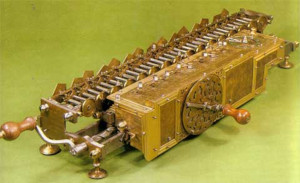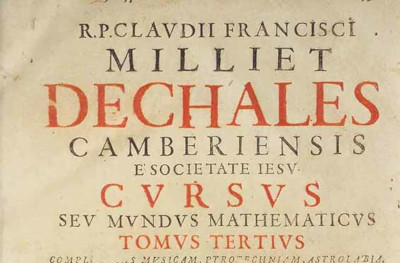
Tito Livio Burattini
In the 1650s the Italian scientist Tito Livio Burattini created a calculating device (so-called ciclografo), which in 1658 (or even before) he donated to Ferdinando II de’ Medici, Grand Duke of Tuscany (there are two letters from the Italian scientist Giovanni Alfonso Borelli, dated November and December 1658, which mentioned..Read More
Samuel Morland
The English polymath Samuel Morland invented in the early 1660s a total of three calculating machines: one for multiplication and division, one for trigonometry, and one for addition and subtraction. Morland’s calculating machines were simple but became rather popular and London instrument-makers were still selling Morland’s calculators as late as..Read More
Charles Cotterell
In 1667, Sir Charles Cotterell, an English courtier and translator, suggested a calculating instrument, called Arithmetical Compendium (Instrument for Arithmetick). It was a combination of Napier’s Bones with a bead-type abacus, used to avoid writing down the partial products of multiplication using the rods. In fact, Cotterell’s idea was popularized..Read More
Athanasius Kircher
The prominent German Jesuit polymath Athanasius Kircher, whose interests covered “everything under the sun”, has a significant place in this site, because of his version of the Llullistic method, his automata, and his calculating tool Organum Mathematicum. Let’s see what is his contribution in the area of computing. *** Kircher’s..Read More
Claude Perrault
Around 1670 the Parisian doctor of medicine and self-taught architect Claude Perrault devised a simple calculating device, called Abaque Rhabdologique. The device was firstly described in a small book—Recueil de plusieurs machines, de nouvelle invention… (Collection of several newly invented machines…) published in 1770 in Paris, which 22 pages of..Read More
Gottfried Leibniz
The great polymath Gottfried Leibniz and Charles Babbage are (to my mind) the two greatest persons in the history of computers and computing because only they managed to anticipate events in this area for centuries. In the second half of the 17th century, Leibniz not only created the first mechanical..Read More
René Grillet de Roven
In 1673 the Parisian mechanic and watchmaker of King Louis XIV, René Grillet de Roven, published the small (49 pages) book Curiositez mathematiques de l’invention du Sr Grillet horlogeur a Paris. The book (see its title page nearby) describes several different inventions, but most of it is devoted to his..Read More
Claude Dechales
The French Jesuit mathematician Claude François Milliet Dechales (1621–1678) was best remembered for his book Cursus seu mundus mathematicus, a complete course of mathematics, published in Lyon in 1674. Dechales published also several other books, and in one of them, devoted to the principles of navigation—L’ art de naviger demontré..Read More
Robert Hooke
Various attempts for transmitting messages overland date back to the millennium before Christ, and include ingenious uses of homing pigeons, heliographs (mirrors), flags, torches, and beacons, but none of them gained wide currency. One of the earliest known today examples is described by the ancient Greek tragedian Aeschylus (523 BC-456..Read More
Cesar Caze
The simple adding device of the Frenchman Cesar Caze (1641-1719), which he called Nouvelle machine arithmétique and created around 1696, could be considered as one of the most basic calculating devices, which can be invented, a simplified version of the Abaque Rhabdologique of Claude Perrault. etween 1704 and 1708 Caze..Read More









